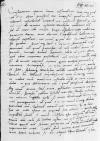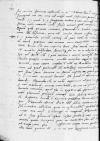Constitueram operiri litteras Celsitudinis Tuae neque quid ad Celsitudinem Tuam dare, priusquam eas recepissem, quod in illis et uberiorem rescribendi materiam me nacturum sperarem et iudicium tuum de itinere instituto ⌊Parrhisios⌋ auditurus eram. Sed cum mora illa nimis longa desiderio meo videretur, praevenire litteras tuas decreui. Cupidissime hactenus Celsitudinis Tuae responsum exspectavi, nec mirum, ex quo tota studiorum meorum spes pendeat. Semel atque iterum e ⌊Louanio⌋ ⌊Anthuerpiam⌋ misi percontatum, num quid pervenisset, cum autem viderem nimis rem protrahi, imminere saeuitiam hiemis, sodales, cum quibus decreveram abire, maturare profectionem, nisi relinqui mallem, coactus sum de itinere cogitare. Mutuo igitur accepta pecuniola a mercatore Anthverpiensi in usus itineris commoda, anchoram solvi feliciterque ⌊Parrhisios⌋ Calendis Novembribus[1] allapsus sum. Bonarum hic lectionum frequentissima copia est tamque varia, ut videar mihi lautissime instructae mensae et cenae assidere dubiae, in qua deliberacione opus est quid potissimum decerpatur. Atque vtinam primo statim anno posthabito ⌊Lovanio⌋ me huc contulissem[2], fortassis rectius consultum meis esset studiis, nihilominus resarcire neglecta possem, si unus tantummodo annus studiis meis prorogaretur. Id, quod Celsitudinis Tuae in manu est neque dubito paternitatem tuam
habituram rationem mei conatus. Si ⌊eo loco ⌋ sitae res meae essent, ut progredi sine alienis impensis possem, impudenter facerem, si amicis molestus esse numquam desinerem, quoniam autem talis sit conditio nostra, ut nisi implorata ope aliena exorsam telam feliciter pertexere non possum, connivendum credo importunitati meae. Cuperem sane vnius anni curriculum bonis litteris tribuere, si Celsitudini Tuae aliqua ratione commodum esset,
sin minus, fortunae cedendum erit. Tanta hic est iniquitas sumptuum, ut eos vix ad mensem vnum sustinere potero, qu[os] tamen (si modo Celsitudo Tua suppetias tulerit) ita corrigam, ut sentias mihi maiorem curam fuisse animi, quam corporis. Operam, quam primae citationi ⌊Alexandri a Suchten⌋ impendimus, omnem lusimus[3]. Quae nam causa fuerit, nescio, nisi qu[od] ⌊nepos⌋ Celsitudinis Tuae praetendat manum notarii non satis notam in ⌊urbe⌋ fuisse cum tamen praecipui nominis notario eam exequendam tradiderim, verum bonus ille vir cupidus lucri, suae tamen cuti metuen[s] non audebat subscribere famulique sui in ea re abusus est opera. Scis enim bullam illam (quam vocant) auream[4] concessam ⌊Carolo⌋ a ⌊Clemente⌋, pontifice maximo, multis oneribus regiones caesareas eximere, inter cetera nephas est ullum ex ⌊Brabantia⌋ ⌊Romam⌋ citare, ad quod praestandum omnes tabellarii iuramento astringuntur. Qui secus facit,
incurrit in poenam capitis , proscriptionis et priuationis omnium bonorum. Ob quod, cum denuo mihi esset vocandus ⌊Alexander⌋ ille in ⌊urbem⌋ egerrime, ut praestare potui per notum tabellarium, omnes recusabant, et me, ne quid tale tentarem, monebant aequum esse in experiendo periculum. Laborabam plurimum, priusquam choragum huic fabulae commodum invenirem. Repertus tandem est Romanae praxticae homo doctissimus, qui ⌊Alexandro ⌋denuo dixit diem omnibus cautionibus et solemnitatibus adhibitis, quas in instrumentum publicum congestas ⌊nepoti tuo⌋ misi. Insumpsi in negotium ⌊Alexandri⌋ (nam id te scire plurimum referre ⌊Caspar⌋ scribit[5]) tres ungaricos aureos, praeter sumptus, quos in itineribus feci, dum litteras ad trapezitas fero. Affirmat ⌊nepos tuus⌋ perditissimos illos homines, quibus cum Celsitudine Tua res erat, dignissimis tractari modis
ac vinculis coercitos, etiam de vita periclitari, quo sane nihil gratius audivi. Sic sit/fit omnibus, quibus studium est
bonorum famam nomenque denigrare.
De reliquis quoniam pleraque talia sunt, quae litteris mandari non volunt scribere supersedebo. Talia nunc sunt tempora, ut etiam dictorum per incuriam elapsorum gravissimae poenae sint. Rumor hic maximus est belli futuri inter ⌊caesarem⌋ et ⌊regem Francorum⌋. Deus Optimus Maximus, qui fluctibus imperat fluctuantes animos potentum componat eosque aliquando in communem Christiani nominis hostem dirigat.
Feliciter valeat Celsitudo Tua.
[1 ] November 1
[2 ] After studying at Wittenberg university in 1538 - 1540, Knobelsdorf immatriculated at the university of Lovanium in March 1541
[3 ] Aleksander Suchten wad accused of heresy in 1541
[4 ] Bulla aurea - Golden Bull, a fundamental law of the Holy Roman Empire. It was signed by the Emperor Charles IV, January, 1356, during the Diet of Nuremberg
[5 ] Letter unknown



